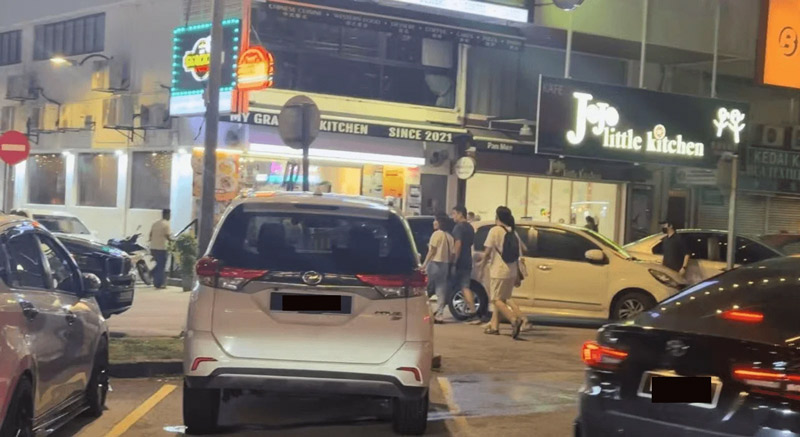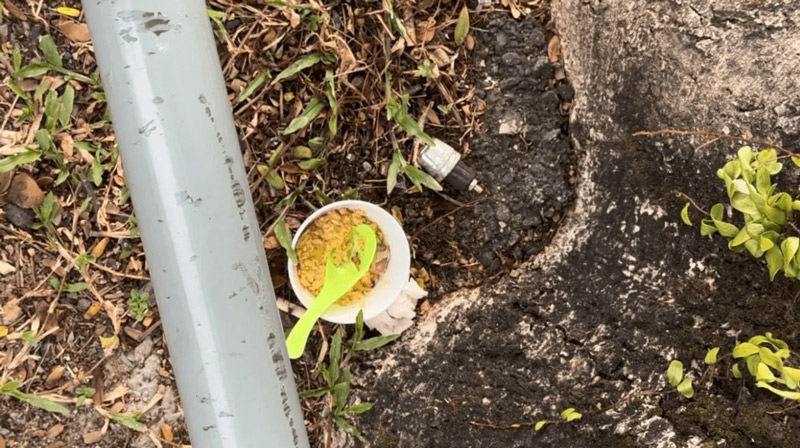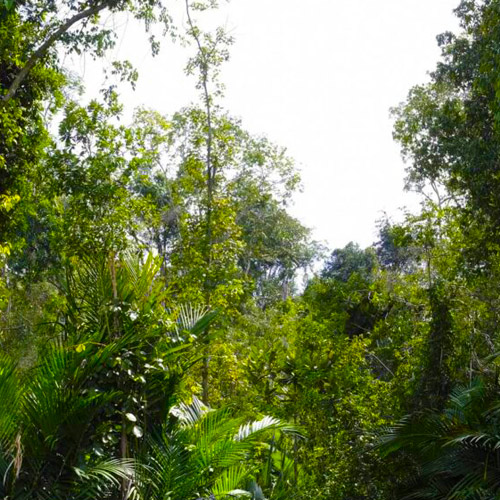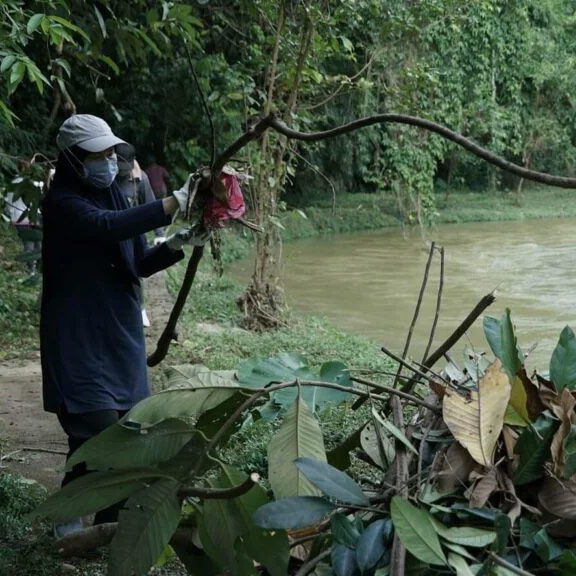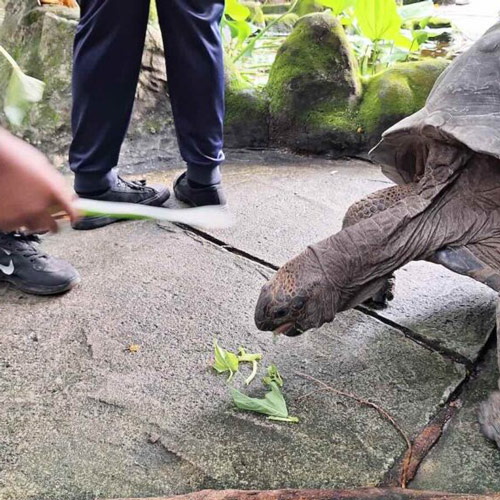Note: This story might contain factual or contextual inaccuracies as it was submitted by the authors as part of a competition and was published for the judges to evaluate without any editing or corrections made by the organisers or YELL.
Once a jealousy-evoking street, now it bears a face of sorrow
As night falls and neon signs glow, the SS2 Jalan SS2/63 stalls buzz with crowds again. But beneath the noise is the stench—disposable plastics, oily food packaging, and bubble tea cups litter the place, crunching on the ground. Rats scurry around drains, and cockroaches run up the legs of stools and into the rubbish. Where previously renowned for its food and diversity, SS2 is now buried under another kind of ‘scent.’ All these have an effect not only on one trip but on thousands of lives a day.
A takeaway box tossed on the street, with leftover soup still inside. (Credit: Zhang Yuchen and Jiang Yingxuan)
It started with dinner waste
SS2 did not become filthy immediately; it was gradually lost to daily neglect. Plastic bags were thrown in corners, drink glasses were left on benches, and tissues drifted into drains. These minor “leftovers” cumulatively altered the neighbourhood’s image, driving people away and leaving sellers defenceless.
“I wrap up the trash and sweep my stall every night after closing, but people still throw trash around,” a three-year SS2 stall owner xclaimed in frustration. “I just wish it can be cleaner here. If the environment improves, more people will visit, and business will
naturally be better.”
Another customer who hailed a taxi expressly to sample the night market was also disappointed: “I go to SS2 every Monday, but I always see trash and drink cups everywhere,” she said. “I’ve read so many negative reviews on Xiaohongshu, I’ve started to wonder whether it’s even worth going back.”
As businesses struggle to maintain appearances, visitors are refraining from returning. The rubbish has grown into a wedge between people and SS2 and has caused this society—once called a ‘food paradise’—to appear far less appealing.
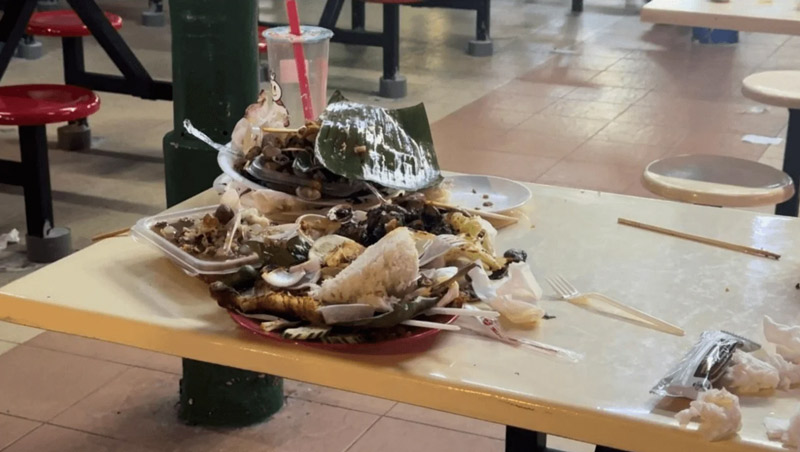
After finishing their meal, the customers left all their trash and leftovers scattered on the table. (Credit: Zhang Yuchen and Jiang Yingxuan)
We’re not complaining; we need to do something
Instead of simply whining, we took action to bring about change in SS2. We strolled down SS2 Street around midnight with waste bags, collecting plastic bags, drink glasses, and food containers. In barely ten minutes, the bags were full—especially beneath trees, on lawns, and behind stalls where rubbish is easily overlooked.
An elderly woman gave us a quiet nod; someone whispered a soft “thank you.” Most walked past, pretending not to see. The trash we collected—plastic bottles, boxes, even take-out with leftover soup—was often smelly and hard to touch.
Though we just cleaned for an hour, it reminded us that waste does not appear on its own. It stems from little daily choices such as casual tossing, quiet, or inactivity. Perhaps change begins with just taking a few more steps to find a trashcan. We have not come to whine but to demonstrate to SS2 that you deserve dignity and clean streets.
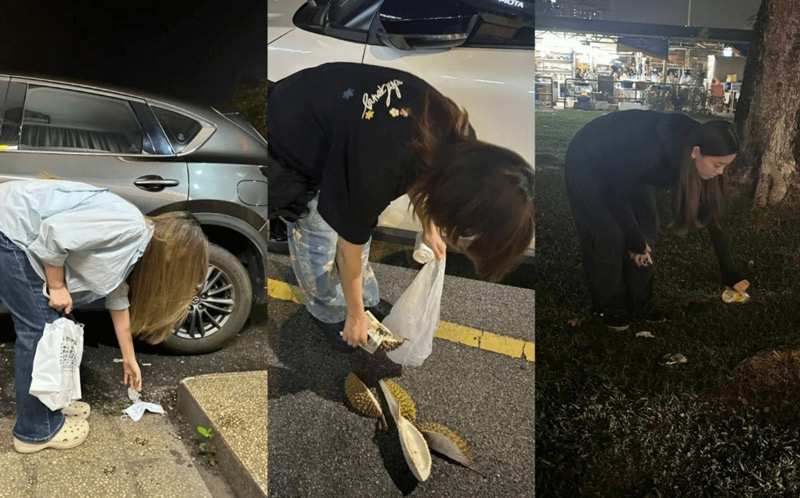
Picking up trash in SS2 — just trying to do our small part. (Credit: Zhang Yuchen and Jiang Yingxuan)
Streets aren’t naturally clean—people make them clean
A clean city results from mutual systems and responsibilities; it is not an automatic thing. Littering is a crime in Singapore, where more than 20,000 fines were issued in 2023, the first-time offenders paying SGD 300. To make punishment also public education, repeat offenders can be jailed and given Corrective Work Orders (CWOs), where they must clean the streets wearing neon-coloured vests.
In Taiwan, the morning routine is “no ground litter.” When trash trucks are broadcasting Beethoven, the citizens emerge and take out the trash themselves, so illegal dumping is essentially impossible. The reward: Taipei cut residential waste by two-thirds and boosted recycling to more than 55%.
It’s not about sweeping faster, but designing better systems together.
Reviving SS2 takes four actions—from you and me
To really make SS2 come alive again, we can begin with five clear, concrete directions, making the vision a power for change.
Placing additional recycling containers in high-traffic locations, with clear signs on what can and cannot be recycled, helps to eliminate excuses for littering. In Taipei, introducing 600 bins with a ‘no littering’ ordinance increased recycling rates by 55% and reduced home garbage by two-thirds.
Street cleaning must also be shared among businesses. Adopting Tokyo’s “Shoppin Street Joint Cleaning System,” businesses come to an agreement where they are responsible for clearing the area in front of and around their stores, and rotating among themselves to take part in regular group cleaning. They who maintain the agreement are praised, and those who do not are reminded. This practice encourages a culture of responsibility among businesses and assures long-term street cleaning.
For night market waste management in the evening, the Myeongdong shopping district of Seoul is a good model to follow: after stalls are dismantled, a special night cleaning team is already on the scene, riding electric cleaning trucks on patrol, keeping the street tidy day and night.
By establishing a pattern, social media may encourage polite behaviour. By launching competitions like #KeepSGClean on social media sites like Instagram and TikTok, Singapore’s NEA encourages people to publicise their cleanup activities and promote civic culture.
Perhaps SS2 can start with an easy online activity to drive ongoing changes offline too.
What we fight for are not just the streets, but each other’s lives
SS2 is not just a street; it’s a way of life—the smell of smoke from the street hawkers, the hot stir-fried noodles at midnight, and a part of the daily routine for so many. Avibrant activity centre with the zest of day-to-day living should not be covered in trash nor dull and weary due to day-by-day abandonment.
Good food should not be hidden beneath plastic, and streets should not be littered with grease and bottles. Cleaners alone cannot build a clean city; we must all choose to waste less, speak up, and help. The instant we care, SS2 begins to alter.
It is not other people’s job, but ours. What makes a place beautiful is not its prosperity, but the number of people willing to bend down for it.
This story is a finalist entry that was produced as part of the “Environmental Stories Workshop and Competition”. The workshop and competition was co-organised by Macaranga Media, Universiti Malaya, and Taylor’s University. The event was funded by a grant from Youth Environment Living Labs (YELL), administered by Justice for Wildlife Malaysia. The content of this story does not necessarily reflect the opinion of YELL and their partners. The Award Ceremony will be held on 2 August at Universiti Malaya.

